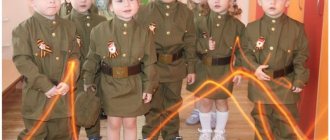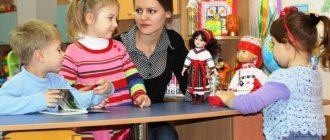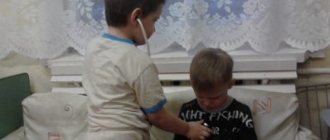Spiritual and moral education of preschool children in preschool educational institutions
Elena Kotsura
Spiritual and moral education of preschool children in preschool educational institutions
The problem of spiritual and moral education of preschool children has undergone a number of qualitative and quantitative changes over the past decades.
The loss of moral guidelines, the devaluation of such categories as conscience, honor, and duty led to negative consequences in society: to social orphanhood, loss of interest in learning and self-improvement, to parental irresponsibility and indifference to the upbringing of the younger generation, not only among parents from difficult families, but also for those who are busy with their careers and have neither the time nor the desire to devote their energy to raising their own children . Society is beginning to clearly understand that spirituality and morality are inextricably linked with social responsibility, which cannot be established without the means to ensure the spiritual and moral development of a person. for spiritual and moral education will help give a new impetus towards the much-desired changes and consolidate them in society as quickly as possible .
The importance of the spiritual and moral education of the younger generation is especially emphasized in psychological and pedagogical research (Koval N.A., Mallaev D.M., Ponomarenko V.A., Chernyaev V.V., etc.)
.
The exposure spiritual and moral sphere to social influences has made it relevant to study approaches to his spiritual and moral education .
However, such education today is linked primarily to the activities of educational institutions. That is why at present it is extremely important to create a system of spiritual and moral education in kindergarten , built on the values of traditional spiritual culture , meeting the needs of the development of a spiritually healthy person .
The key task of modern state policy of the Russian Federation is to ensure the spiritual and moral development and education of the individual and citizen of Russia.
The spiritual and moral education of the younger generation is considered on the basis of the “Concept of spiritual and moral development and education of the personality of a citizen of Russia.” The concept was developed in accordance with the Constitution of the Russian Federation, the Law of the Russian Federation “On Education”
, based on the annual messages of the President of Russia to the Federal Assembly of the Russian Federation.
In Russia, on August 27, 2013, the Council of the Ministry of Education and Science of the Russian Federation on federal state educational standards approved a new state standard for preschool education . One of the objectives of the standard is to combine training and education into a holistic educational process based on spiritual, moral and sociocultural values and socially accepted rules and norms of behavior in the interests of the individual, family, and society.
The analysis and content of the materials showed that a common understanding of spiritual and moral education in the scientific and pedagogical community has not yet developed. Spiritual and moral education in state and municipal organizations should be variable and voluntary, and provide for the possibility of ideological choice.
Thus, each preschool organization , when developing a basic general education program, must include the tasks of spiritual and moral education of preschool children and coordinate them with the parents (legal representatives)
of children attending kindergarten.
In the context of the transition to the new Federal State of preschool education, the main tasks of spiritual and moral education moral education of preschool children :
•formation of the principles of patriotism and citizenship;
•formation of a humane attitude towards people and the environment;
•formation of spiritual and moral attitudes and a sense of belonging to the cultural heritage of one’s people;
•respect for one's nation;
•understanding of one’s national characteristics;
•formation of self-esteem as a representative of one’s people;
•respect for representatives of other nationalities;
•formation of positive, friendly, collective relationships;
• fostering a respectful attitude towards work.
Spiritual and moral education is a long-term process, involving an internal change in each participant, which can be reflected much later, which makes it difficult to assess the effectiveness of the activities carried out, but does not reduce the significance of our work. “Let the child feel the beauty and admire it, let the images in which the Motherland is embodied forever be preserved in his heart and memory.” V. A. Sukhomlinsky.
The spiritual and moral education of preschool children is carried out in preschool organizations, taking into account national and regional characteristics. A necessary condition for the spiritual and moral education of children is the creation of a subject-development environment.
When organizing role-playing games, the moral side of role-playing interaction should be taken into account: the doctor not only treats the sick, he empathizes, shows mercy and compassion, the teacher is patient and kind, the seller is honest and conscientious.
Spiritual and moral content can be integrated into various types of children's activities:
- productive activities: making crafts for relatives and birthday people, for Orthodox holidays, drawings based on works of art;
— theatrical activity allows you to embody moral feelings in simulated situations ( “What would you do”
, (
"Let's make it up"
)
In work on spiritual and moral education, you can use the following forms of work:
- reading folk and original fairy tales, literary works from the series “For Children about Faith”
, tales of mother's love;
— a series of classes called “Lessons in Kindness”
, the purpose of which is
to educate moral values and self-knowledge in the world of people.
- acquaintance with calendar Orthodox and folk holidays and holding some of them (Nativity of the Blessed Virgin Mary, Christmastide, Maslenitsa, Easter, Annunciation, Trinity)
— thematic exhibitions of children's creativity.
- introducing children to the life of Orthodox saints and defenders of the Russian land, as an example of high spirituality and morality , patriotism in the form of a story using videos, children's literature before the day of remembrance of the saint as a separate lesson or as part of a lesson to familiarize themselves with the environment before Defender of the Fatherland Day, Day Victory.
— excursions to the temple in order to get acquainted with the features of architecture, internal structure, iconography;
— nature excursions;
— staging skits on moral themes (about forgiveness, hard work, respect for elders)
.
Preschool childhood is an important period in a child’s life, when basic ideas about the surrounding reality, ideas about the family structure and native land are formed. It is necessary to preserve everything that has been accumulated by previous generations and, by multiplying it, bring it into the modern educational process.
Used Books:
1. Integrated cycles of classes on familiarization with Russian folk culture. Popova T. D. “Mosaic-Synthesis”
, 2010. 2. Knyazeva O. L., Makhaneva M. D. Introducing
children to the origins of Russian folk culture.
,2004 3. MiklyaevaN. V., Miklyaeva Yu. V., AkhtyanA. G. “Social and moral education of children from 5 to 7 years old ”
. M., 2006.
What do they do in kindergarten
The formation of moral qualities in the consciousness occurs throughout life. Thus, preschoolers spend most of their time in the camps of a preschool institution. As a result, teachers devote more time to studying moral principles and spiritual perception than parents. Parental activities should be more aimed at consolidating the knowledge acquired in a preschool institution. For example, in the evening, upon returning home, you can ask the baby about what they did this afternoon. The kid will talk with admiration about those moments that he liked and liked according to his personal qualities. The task of mom and dad is to ask about all the moments of learning, since some of them might not be “liked”, as a result of which he will talk about them reluctantly or casually. At this moment, parents should recognize the formation of the level of spiritual and moral education in preschoolers and try to direct their thoughts, adjusting them taking into account religious, social and legal foundations.
For the social and moral development of a preschooler, teachers practice the following techniques in a preschool institution:
- Get acquainted with different aspects of the social environment. Oddly enough, in kindergarten only the theoretical part is studied - the basis falls on mom and dad, who already lay the practical part at home by their own example. For classes, a presentation is often used - part of the visually effective method.
- To develop moral principles, kindergartens practice joint games followed by analysis of the conflict situation that has arisen, which constantly arises during play. Among other things, in a preschool institution, children additionally learn to share, help each other, and distribute any responsibilities (the latter is controlled by teachers).
- It is mandatory for preschool institutions to perform personal responsibilities. For example, duty in the kitchen and toilet is distributed among preschoolers - children must monitor the condition of their area and promptly tell teachers and assistant teachers about any problem that has arisen. As a rule, those on duty in the kitchen help set the table, and in the toilet they monitor the cleanliness of the floors - the presence of moisture on the tiles can cause injury.
The presented actions should also be practiced at home, since the child needs to be shown the fact that such practices are the norm, and not a wish or obligation only within the walls of a preschool institution. Practical exercises will help to form a vision of responsibility and the presentation of social meanings, foundations, and rules.
Spiritual development of a child
Human spirituality is a complex harmonious combination of personal qualities and mental properties, which form the basis for mental and personal improvement. A logical question arises: what are the signs of the development of spirituality, or, to put it differently, what exactly in the thoughts, feelings, and actions of a child gives reason to state whether this process is going on?
Human improvement can be traced by observing positive changes in the components of spirituality:
• In the mental (intellectual) - from cognition of objects with the help of the senses, to understanding their essence, interrelation, the ability to independently solve intellectual tasks of varying complexity;
• In the sensory-emotional - from simple emotions (surprise, joy, sadness, envy), to the ability to love, empathize, sympathize;
• In the humanistic - from childish egoism, egocentrism, to altruism, humanism, that is, the desire to do something for other people, maybe even yielding to one’s own interests;
• In effective-volitional - from involuntary actions to meaningful actions, the ability to manage one’s behavior;
• In the aesthetic component - from simple contemplation of aesthetic objects, natural phenomena, to the need to create beauty with one’s own hands or through one’s own efforts, the ability to experience a feeling of satisfaction from beauty.
Consequently, the development of a child’s spirituality is a complex, long-term, but extremely urgent problem, and it is called upon, first of all, to solve it by psychologists, teachers, parents, that is, those people in whose hands the future and fate of a person just entering life are in their hands.
Where does Man begin? From purely human activities? From his actions regarding other people? Apparently this is true. But the problem is that the child should develop such needs that would encourage him to spiritual, humane actions and activities. After all, as psychologists have proven, it is needs that push a person to activity.
Therefore, the first step in educating a Man is the development of his spiritual needs - in communication, knowledge of himself and the Universe, aesthetic satisfaction, the need for charity.
Some teachers and parents have the mistaken opinion that a child who has been deprived of maternal care and affection will grow up sensitive to human suffering, sympathetic and kind. However, psychological research shows that a lack of love, respect, care causes the formation of indifference, and even aggressiveness.
Science knows for sure that a person who wants to do good is capable of empathy if he feels safe and emotionally “warm” from birth. Already in the first days of life, attentive parents observe that the child has a need for love. To satisfy it, the baby needs an atmosphere of harmony in the family, varied communication, he needs a sensitive, gentle attitude, emotional comfort, and a feeling of significance for the adults around him.
The source of the development of spirituality is, undoubtedly, communication, in particular spiritual communication - the exchange of opinions, knowledge, feelings, impressions, interests. This subtlest and most complex type of communication begins early in a child’s life.
In its mature form, spiritual communication becomes possible provided that people have interest and trust in each other. If parents become interesting to a child, the child develops a need for communication quite early. And later, there is only one thing left for parents - not to lose the trust of their son or daughter.
One of the first, with the assistance of parents, children develop another spiritual need, which is to expand knowledge about the environment and themselves. If it receives constant support from adults, the cognitive need subsequently turns into curiosity, a personality trait that is considered the basis for the development of thinking.
Speaking about the development of spirituality, it is necessary to emphasize the need to form a unique, purely human need to perceive and create beauty, that is, an aesthetic need. For its development, it is necessary to have appropriate attention from adults to the peculiarities of the child’s perception of aesthetic objects and phenomena, as well as the purposeful use of appropriate forms of educational work, including visits to museums and exhibitions, theaters, as well as the child’s own creativity.
Experts consider humanity to be the highest indicator of spiritual development - an attitude towards any form of life as the highest value, and a selfless perception of the life of another person (being). The psychological basis for the development of humanistic qualities of an individual is the need for charity. Apparently, this is the most significant human need. The complexity of its formation is due to the fact that young children are egocentric by their psychological nature. That is, they perceive themselves as a certain center of life and attention of adults, which really corresponds to reality. Therefore, parents have an important task: to convince the baby that, besides him, there are other people, children, creatures who also need attention, help, and, moreover, also have the need to do good.
Spiritual reading
1. You should read the Gospel daily. Since ancient times, teaching the basics of faith has been the responsibility of the father. It is advisable to make this a nightly tradition. Nowadays, there are many manuals for the religious education of children.
2. It is also useful to read the lives of saints, adapted for children. The child should not be a passive listener; after reading, he should discuss what he read and ask questions. It is important to show the saints not as legendary heroes of bygone times, but as our eternal mentors and helpers to whom we can turn. Show what was most important in the lives of all these great people.
3. A useful tradition for children and adults is to daily write out and memorize a verse that touched the heart from a chapter of the Gospel read.






